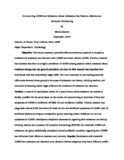Co-occurring ADHD and Substance Abuse : Substance Use Patterns, Motives and Executive Functioning
Author
Stanton, Marina R.
Abstract
Objective: This study examined potential differences between patients in outpatient treatment for substance use disorders with ADHD and those without ADHD. Previous research has indicated that there is a higher prevalence of ADHD among patients within substance abuse treatment settings than the general population, but there is little research that describes how individuals with this comorbidity might differ. We were interested in determining potential differences between these groups in the areas of substance use history, drinking motives, and executive functioning which might influence the treatment of substance use disorders. Method: A total of 23 participants (mean 25.5 years) from a local substance use treatment facility qualified for the study based on the results of a prescreening to determine if they had symptoms of ADHD in childhood (WURS-25) and adulthood (ASRS). Thirteen patients met diagnostic criteria (CIDI interview) for both current and childhood symptoms of ADHD with 10 additional patients serving as a comparison group reporting neither childhood nor current symptoms of ADHD. Participants completed assessments regarding their substance use history, drinking motives and a measure of executive functioning (BDEFS); the comorbid ADHD and substance use group additionally completed several qualitative questions regarding how ADHD has influenced their efforts at treatment and recovery. Results: Participants with comorbid ADHD and substance use disorders were clearly a distinct subgroup; they had a different profile for substance use history, including using more overall types of substances as well as cocaine and prescription stimulants; were more likely than those with substance use alone to initiate alcohol, nicotine, and marijuana at an earlier age; and had used alcohol for a longer period of time. Motives for drinking did not differ although the ADHD group had somewhat more conduct problems in childhood. Both groups reported significant difficulties with executive functioning, but those with comorbid ADHD and substance use disorders reported significantly more problems with executive functioning in daily life than those without ADHD. Although the number of past treatment episodes did not differ, qualitative responses suggested ways ADHD might impact treatment. Conclusion: More research is needed to better characterize comorbid ADHD and substance use disorder and determine the implications such differences might have on treatment and recovery efforts.
Date
2014
Citation:
APA:
Stanton, Marina R..
(January 2014).
Co-occurring ADHD and Substance Abuse : Substance Use Patterns, Motives and Executive Functioning
(Master's Thesis, East Carolina University). Retrieved from the Scholarship.
(http://hdl.handle.net/10342/4711.)
MLA:
Stanton, Marina R..
Co-occurring ADHD and Substance Abuse : Substance Use Patterns, Motives and Executive Functioning.
Master's Thesis. East Carolina University,
January 2014. The Scholarship.
http://hdl.handle.net/10342/4711.
May 10, 2024.
Chicago:
Stanton, Marina R.,
“Co-occurring ADHD and Substance Abuse : Substance Use Patterns, Motives and Executive Functioning”
(Master's Thesis., East Carolina University,
January 2014).
AMA:
Stanton, Marina R..
Co-occurring ADHD and Substance Abuse : Substance Use Patterns, Motives and Executive Functioning
[Master's Thesis]. Greenville, NC: East Carolina University;
January 2014.
Collections
Publisher
East Carolina University

